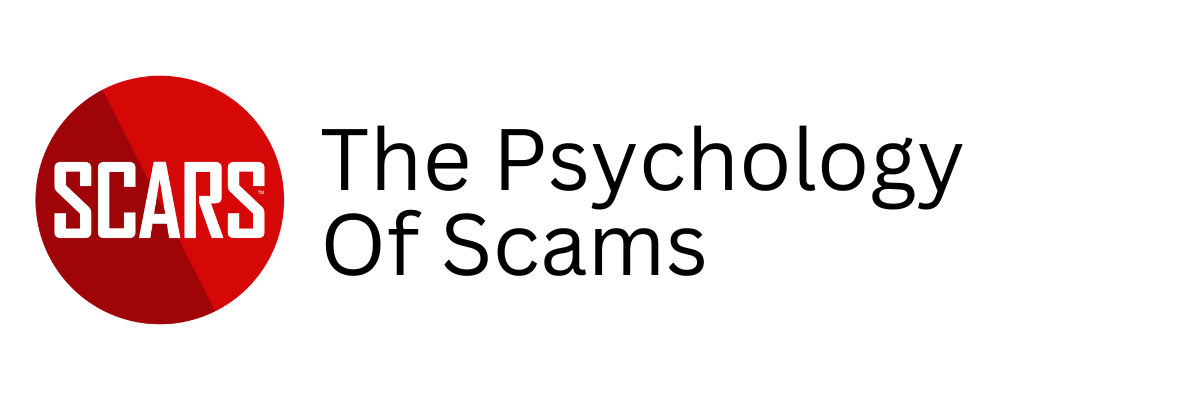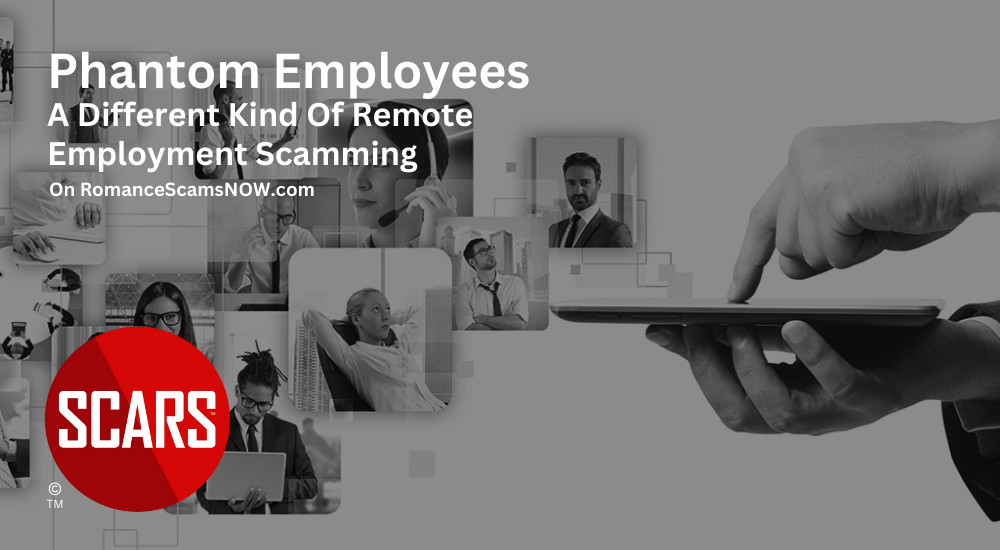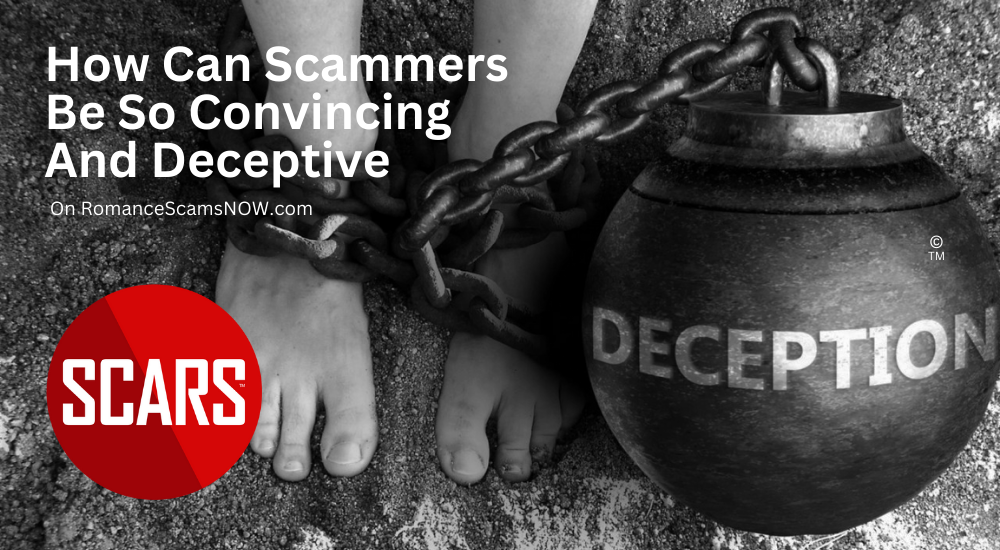
SCARS Institute’s Encyclopedia of Scams™ Published Continuously for 25 Years

Article Abstract
When it comes to scams and fraud, perpetrators rely on a combination of psychological tactics and cognitive biases to effectively deceive their targets. While victims may wonder how scammers can be so convincing, it’s important to recognize that their success lies not in their persuasiveness, but in their adept manipulation of human psychology.
By leveraging fundamental aspects of human cognition, such as trust, authority, and social influence, scammers can craft deceptive narratives that disarm their victims’ skepticism and elicit compliance. Additionally, the anonymity of digital platforms enables scammers to cast wide nets, exploiting vulnerabilities and cognitive shortcuts to manipulate perception and decision-making.
Understanding the art of persuasion, cognitive biases, and the culture of corruption is crucial for recognizing and mitigating the threat posed by scams and fraud. Through education, awareness, and regulatory measures, individuals can empower themselves to safeguard against deception and protect against falling victim to fraudulent schemes.

Deciphering the Art of Deception: Understanding the Psychology Behind Scams and Fraud and How Scammers use It!
We are often asked by scam victims “How Can Scammers Be So Convincing and Deceptive?”
But the answer is surprising for most victims. Scammers are not very convincing, deceptive yes, convincing no.
The prevalence of scams, fraud, and deception underscores the pressing need to understand the underlying psychology behind such nefarious deceptive practices.
While it may seem perplexing how individuals can be so convincing in their deceitful endeavors, a closer examination reveals several key psychological mechanisms at play.
In this article, we are not going to go into the depth of manipulation technique, but rather answer the basic question is a direct form.
Leveraging Human Psychology
First and foremost, most scams are not all that convincing but successful scams leverage the fundamental aspects of human psychology, including trust, authority, and social influence.
Perpetrators adeptly exploit these vulnerabilities and cognitive biases to manipulate their victims into believing their false narratives. By assuming personas of authority or expertise, scammers engender a sense of credibility and trustworthiness, effectively disarming their victims’ skepticism. In fact, they hijack the scam victim’s own brain to take control over them (see Amygdala Hijacks.)
Culture of Corruption
To begin, we have to look at the culture of corruption that exists around the world, especially in developing countries, that breeds scammers & fraudsters.
The culture of corruption and the widespread acceptance of deceit in certain countries create an environment that fosters the ease with which scammers operate and perpetrate their fraudulent schemes. In these regions, corruption is so deeply entrenched in various aspects of society, including government institutions, law enforcement agencies, and business practices that a significant percentage of the population engages in deception in one form or another. As a result, individuals become desensitized to dishonesty and unethical behavior, leading to a normalization of deceitful practices.
One significant factor contributing to the prevalence of scams in these environments is the lack of effective regulatory oversight and enforcement mechanisms. When corrupt officials turn a blind eye to fraudulent activities or actively participate in them, scammers face minimal consequences for their actions, emboldening them to engage in increasingly audacious fraud schemes. Also, the absence of robust legal frameworks and accountability mechanisms allows scams to proliferate unchecked, creating a fertile ground for criminal enterprises to thrive.
Additionally, cultural attitudes and norms that prioritize personal gain and success at any cost may further perpetuate the acceptance of deceitful behavior. In societies where wealth and status are highly valued, individuals are more willing to engage in unethical practices or turn a blind eye to dishonesty if it promises material rewards or social advancement.
The Art of Persuasion
The art of persuasion plays a pivotal role in deceptive practices. Skilled manipulators employ persuasive techniques such as flattery, mirroring, gifts, and emotional appeals to establish rapport and disarm their targets. Through carefully crafted messaging and calculated emotional manipulation, scammers capitalize on individuals’ vulnerabilities and desires, making them more susceptible to their schemes, allowing them to be isolated and almost completely controlled.
The art of persuasion refers to the skillful use of communication techniques and psychological strategies to influence others’ beliefs, attitudes, behaviors, or decisions. Ideally, it involves understanding human psychology, emotional triggers, and cognitive biases to effectively convey messages and sway opinions, however, in the scammer’s case, they are just following their scripts.
Key Elements of the Art of Persuasion include:
- Establishing Credibility: Persuaders often begin by establishing credibility and trustworthiness to enhance their persuasive appeal. This may involve demonstrating expertise, providing evidence or testimonials, or leveraging social proof to showcase authority or competence in the subject matter.
- Building Rapport: Creating a sense of connection and rapport with the audience is essential for successful persuasion. Persuaders may employ techniques such as active listening, empathy, and mirroring to establish rapport and foster a positive relationship with their audience.
- Framing the Message: The way a message is framed can significantly impact its persuasive effectiveness. Persuaders may use framing techniques such as positive framing (highlighting benefits), negative framing (emphasizing risks or consequences), or comparative framing (contrasting options) to shape perceptions and influence decision-making.
- Appealing to Emotions: Emotions play a powerful role in persuasion, as people are often swayed by feelings rather than logic alone. Persuaders may use emotional appeals such as fear, hope, joy, or empathy to evoke strong emotional responses and motivate action.
- Providing Social Proof: People are more likely to be persuaded by messages or actions endorsed by others they perceive as similar or credible. Persuaders may leverage social proof by showcasing testimonials, endorsements, or examples of others who have benefited from the proposed course of action.
- Using Persuasive Language: Language choice can significantly impact the persuasiveness of a message. Persuaders may use persuasive language techniques such as rhetoric, storytelling, vivid imagery, or metaphors to captivate attention, evoke emotions, and reinforce key messages.
- Overcoming Objections: Addressing and overcoming objections or counterarguments is crucial for effective persuasion. Persuaders may anticipate potential objections and proactively address them through evidence, logic, or reframing techniques to alleviate doubts and build credibility.
- Call to Action: Persuasion often culminates in a call to action, prompting the audience to take a specific course of action or make a decision. Persuaders may use clear, compelling calls to action that highlight the benefits or urgency of the proposed action to motivate compliance.
Overall, the art of persuasion requires a nuanced understanding of human psychology, effective communication skills, and the ability to tailor messages to resonate with the audience’s values, beliefs, and motivations. Mastering these techniques can empower individuals to influence others positively and achieve their persuasive goals.
The Irony of Control
One of the great ironies in most scams is that the scammers are not actually all that good at what they do, though some have true mastery. This means that most scammers make many mistakes during the course of their scams allowing victims to gain some sense that things are not right, this often allows the victims to escape. Had the scammers been more competent, then most victims would be truly powerless to withstand the scammer’s control.
Because the scammers are not psychologists and not able to master the psychology and are following scripts. This means that their mistakes help victims. But this is changing and many scammers are becoming far better than ever before. Additionally, with the introduction of generative AI, it means that real-time manipulation by AI is becoming a reality – fortunately, still not yet widespread. When AI becomes a part of most scams the losses and damage done will be far greater.
Anonymity
Additionally, the anonymity afforded by digital platforms has facilitated the proliferation of online scams and fraud, and there are currently billions (estimated) of fake profiles in use. This veil of anonymity and the internet platforms’ unwillingness to solve these problems emboldens perpetrators to adopt false identities and personas, shielding them from accountability and detection. Coupled with the vast reach of the internet, this anonymity enables scammers to cast a wide net, targeting unsuspecting individuals across geographical boundaries with ease.
Cognitive Biases and Heuristics
Furthermore, cognitive biases and heuristics, inherent to human decision-making processes, play a significant role in susceptibility to deception. Confirmation bias, for instance, predisposes individuals to seek information that confirms their preconceived beliefs, making them more receptive to misinformation and false promises. Similarly, scarcity bias, fear of missing out, and social proof further compound individuals’ susceptibility to scams and fraud.
Cognitive biases and heuristics play a significant role in the effectiveness of scams by influencing how individuals perceive information, make decisions, and interpret the world around them. Scammers exploit these cognitive shortcuts and mental patterns to manipulate their victims and enhance the success of their deceitful schemes. Here’s how cognitive biases and heuristics contribute to the convincing deception of victims by scammers:
- Anchoring Bias: Victims often rely heavily on the initial information provided by the scammer, known as the anchor, when making subsequent judgments or decisions. Scammers may anchor victims to a high-value or enticing offer at the beginning of the interaction, leading them to overvalue subsequent information or offers presented during the scam.
- Availability Heuristic: This heuristic involves making judgments based on the ease with which relevant examples or information come to mind. Scammers may capitalize on recent events, news stories, or personal experiences to make their scams appear more plausible or urgent to victims, exploiting the availability heuristic to manipulate perception and decision-making.
- Reciprocity Bias: People have a natural tendency to reciprocate favors, gifts, or concessions received from others. Scammers often initiate interactions with seemingly generous gestures or offers to trigger reciprocity bias in their victims, fostering a sense of indebtedness and obligation that makes them more susceptible to further manipulation.
- Social Proof: Individuals are more likely to conform to the actions or beliefs of others, particularly when they perceive those others as similar or credible. Scammers may create the illusion of social proof by fabricating testimonials, reviews, or endorsements to convince victims that their fraudulent offers or claims are legitimate and endorsed by others.
- Scarcity Heuristic: People tend to place greater value on items, opportunities, or information that is perceived as scarce or limited in availability. Scammers exploit the scarcity heuristic by creating a sense of urgency or scarcity around their offers, such as limited-time deals or exclusive opportunities, to compel victims to act quickly and without thorough consideration.
- Confirmation Bias: Victims may selectively interpret or recall information in a way that confirms their existing beliefs, expectations, or desires while disregarding contradictory evidence. Scammers leverage confirmation bias by tailoring their messages or offers to align with victims’ preconceived notions or desires, reinforcing their trust and confidence in the scammer’s legitimacy.
- Optimism Bias: Individuals tend to overestimate the likelihood of positive outcomes and underestimate the probability of negative consequences. Scammers exploit optimism bias by framing their offers or promises in overly optimistic terms, downplaying risks or potential drawbacks to make their scams appear more attractive and appealing to victims.
- Authority Bias: People are inclined to trust and defer to individuals perceived as authoritative, knowledgeable, or credible. Scammers may impersonate authority figures, experts, or trusted institutions to lend credibility to their fraudulent claims or requests, exploiting authority bias to deceive victims into compliance.
See our Catalog of Cognitive Biases here: Cognitive Biases Catalog 2024 (romancescamsnow.com)
Summary
Obviously, this is a brief overview of the topic. However, it will serve as an introduction for new scam victims.
By understanding these cognitive biases and heuristics, psychology and other factors, scammers are able to craft persuasive messaging, manipulate victims’ perceptions, and exploit vulnerabilities in decision-making processes to effectively and convincingly deceive their targets. This underscores the importance of critical thinking, skepticism, and awareness in identifying and avoiding scams.
To fully understand these reasons we encourage you to read our articles on the Psychology of Scams and also visit www.ScamsNOW.com for many more articles on the topics.
In essence, the success of scams and fraud hinges on the intricate interaction of psychological factors and cognitive biases. By understanding these underlying mechanisms, individuals can bolster their defenses against deception and fraud. Vigilance, critical thinking, and skepticism serve as potent antidotes to manipulation, empowering individuals to discern fact from fiction and safeguard themselves against fraudulent schemes.
Addressing the culture of corruption and the normalization of deceit will also be required, and requires comprehensive efforts to strengthen governance, promote transparency and accountability, and combat systemic inequalities. This includes implementing effective anti-corruption measures, enhancing regulatory frameworks, investing in education and public awareness campaigns, and fostering a culture of integrity and ethical leadership. By tackling the root causes of corruption and promoting a culture of honesty and accountability, societies can create an environment that is less conducive to the proliferation of scams and fraudulent activities.
Ultimately, combating scams and fraud requires a multifaceted approach encompassing education, awareness, and regulatory measures. By fostering a culture of skepticism and equipping individuals with the knowledge to recognize and mitigate deceptive practices, we can collectively thwart the efforts of fraudsters and protect ourselves from falling victim to their schemes.
More:
- 7 Psychological Principles of Scams (romancescamsnow.com)
- Cognitive Biases Catalog 2024 (romancescamsnow.com)
- The Psychology of Scams (romancescamsnow.com)
- Scam Basics: Basic Fakery Deception & Lies (romancescamsnow.com)
- To Be A Scammer? An Overview Of Scammers Fraudsters & Online Con Artists – 2024 [UPDATED] (romancescamsnow.com)
- Scammer Methods – A Scammer’s Primer – Part 1: The Introduction (romancescamsnow.com)
- Scammer Methods – A Scammer’s Primer – Part 2: The Questions (romancescamsnow.com)
- Scammer Methods – A Scammer’s Primer – Part 3: The Steps – Grooming & Manipulation (romancescamsnow.com)
- Scammer Methods – A Scammer’s Primer – Part 4: The Distance (romancescamsnow.com)
- Scammer Methods – A Scammer’s Primer – Part 5: The Love Story (romancescamsnow.com)
-/ 30 /-
What do you think about this?
Please share your thoughts in a comment below!
Table of Contents
- An Introduction to Scammer Deceptive Techniques
- Article Abstract
- Deciphering the Art of Deception: Understanding the Psychology Behind Scams and Fraud and How Scammers use It!
- Leveraging Human Psychology
- Culture of Corruption
- The Art of Persuasion
- The Irony of Control
- Anonymity
- Cognitive Biases and Heuristics
- Summary
- More:
LEAVE A COMMENT?
Thank you for your comment. You may receive an email to follow up. We never share your data with marketers.
Recent Comments
On Other Articles
- on Reporting Scams & Interacting With The Police – A Scam Victim’s Checklist [VIDEO]: “Yes, this is a scam. For your own sanity, just block them completely.” Feb 25, 15:37
- on Danielle Delaunay/Danielle Genevieve – Stolen Identity/Stolen Photos – Impersonation Victim UPDATED 2024: “She goes by the name of Sanrda John now” Feb 25, 10:26
- on Reporting Scams & Interacting With The Police – A Scam Victim’s Checklist [VIDEO]: “So far I have not been scam out of any money because I was aware not to give the money…” Feb 25, 07:46
- on Love Bombing And How Romance Scam Victims Are Forced To Feel: “I was love bombed to the point that I would do just about anything for the scammer(s). I was told…” Feb 11, 14:24
- on Dani Daniels (Kira Lee Orsag): Another Scammer’s Favorite: “You provide a valuable service! I wish more people knew about it!” Feb 10, 15:05
- on Danielle Delaunay/Danielle Genevieve – Stolen Identity/Stolen Photos – Impersonation Victim UPDATED 2024: “We highly recommend that you simply turn away form the scam and scammers, and focus on the development of a…” Feb 4, 19:47
- on The Art Of Deception: The Fundamental Principals Of Successful Deceptions – 2024: “I experienced many of the deceptive tactics that romance scammers use. I was told various stories of hardship and why…” Feb 4, 15:27
- on Danielle Delaunay/Danielle Genevieve – Stolen Identity/Stolen Photos – Impersonation Victim UPDATED 2024: “Yes, I’m in that exact situation also. “Danielle” has seriously scammed me for 3 years now. “She” (he) doesn’t know…” Feb 4, 14:58
- on An Essay on Justice and Money Recovery – 2026: “you are so right I accidentally clicked on online justice I signed an agreement for 12k upfront but cd only…” Feb 3, 08:16
- on The SCARS Institute Top 50 Celebrity Impersonation Scams – 2025: “Quora has had visits from scammers pretending to be Keanu Reeves and Paul McCartney in 2025 and 2026.” Jan 27, 17:45
ARTICLE META
Important Information for New Scam Victims
- Please visit www.ScamVictimsSupport.org – a SCARS Website for New Scam Victims & Sextortion Victims
- Enroll in FREE SCARS Scam Survivor’s School now at www.SCARSeducation.org
- Please visit www.ScamPsychology.org – to more fully understand the psychological concepts involved in scams and scam victim recovery
If you are looking for local trauma counselors please visit counseling.AgainstScams.org or join SCARS for our counseling/therapy benefit: membership.AgainstScams.org
If you need to speak with someone now, you can dial 988 or find phone numbers for crisis hotlines all around the world here: www.opencounseling.com/suicide-hotlines
A Note About Labeling!
We often use the term ‘scam victim’ in our articles, but this is a convenience to help those searching for information in search engines like Google. It is just a convenience and has no deeper meaning. If you have come through such an experience, YOU are a Survivor! It was not your fault. You are not alone! Axios!
A Question of Trust
At the SCARS Institute, we invite you to do your own research on the topics we speak about and publish, Our team investigates the subject being discussed, especially when it comes to understanding the scam victims-survivors experience. You can do Google searches but in many cases, you will have to wade through scientific papers and studies. However, remember that biases and perspectives matter and influence the outcome. Regardless, we encourage you to explore these topics as thoroughly as you can for your own awareness.
Statement About Victim Blaming
SCARS Institute articles examine different aspects of the scam victim experience, as well as those who may have been secondary victims. This work focuses on understanding victimization through the science of victimology, including common psychological and behavioral responses. The purpose is to help victims and survivors understand why these crimes occurred, reduce shame and self-blame, strengthen recovery programs and victim opportunities, and lower the risk of future victimization.
At times, these discussions may sound uncomfortable, overwhelming, or may be mistaken for blame. They are not. Scam victims are never blamed. Our goal is to explain the mechanisms of deception and the human responses that scammers exploit, and the processes that occur after the scam ends, so victims can better understand what happened to them and why it felt convincing at the time, and what the path looks like going forward.
Articles that address the psychology, neurology, physiology, and other characteristics of scams and the victim experience recognize that all people share cognitive and emotional traits that can be manipulated under the right conditions. These characteristics are not flaws. They are normal human functions that criminals deliberately exploit. Victims typically have little awareness of these mechanisms while a scam is unfolding and a very limited ability to control them. Awareness often comes only after the harm has occurred.
By explaining these processes, these articles help victims make sense of their experiences, understand common post-scam reactions, and identify ways to protect themselves moving forward. This knowledge supports recovery by replacing confusion and self-blame with clarity, context, and self-compassion.
Additional educational material on these topics is available at ScamPsychology.org – ScamsNOW.com and other SCARS Institute websites.
Psychology Disclaimer:
All articles about psychology and the human brain on this website are for information & education only
The information provided in this article is intended for educational and self-help purposes only and should not be construed as a substitute for professional therapy or counseling.
While any self-help techniques outlined herein may be beneficial for scam victims seeking to recover from their experience and move towards recovery, it is important to consult with a qualified mental health professional before initiating any course of action. Each individual’s experience and needs are unique, and what works for one person may not be suitable for another.
Additionally, any approach may not be appropriate for individuals with certain pre-existing mental health conditions or trauma histories. It is advisable to seek guidance from a licensed therapist or counselor who can provide personalized support, guidance, and treatment tailored to your specific needs.
If you are experiencing significant distress or emotional difficulties related to a scam or other traumatic event, please consult your doctor or mental health provider for appropriate care and support.
Also read our SCARS Institute Statement about Professional Care for Scam Victims – click here to go to our ScamsNOW.com website.
















What’s truly terrifying is the use of AI in conjunction with all that is outlined in this article. Technology needs to align with the negative consequences of how AI can be used as a deceptive tool. If it doesn’t keep up, these criminals will continue to perfect their techniques, making it more difficult to trace them.
It is still so incredible to realize and face the fact that scams are so proliferate in this world and that it is so incredibly easy for people to make money off others. In a world where technology has such a strong foothold, that technology is an integral part of the scammers. Then add to technology, our basic psychology can be used against us. Both technology and psychology joined together and used against us and our basic needs, wants and desires. All I wanted was for someone to understand that my world as I knew it had received a severe blow. I hoped that I could find a person I admired and ask for their guidance. Instead, an unscrupulous person(s) found me, took advantage of a bad medical diagnosis, befriended me, treated me like royalty for some weeks and then manipulated me.
The key elements in the art of persuasion outlined in this article were right on target.